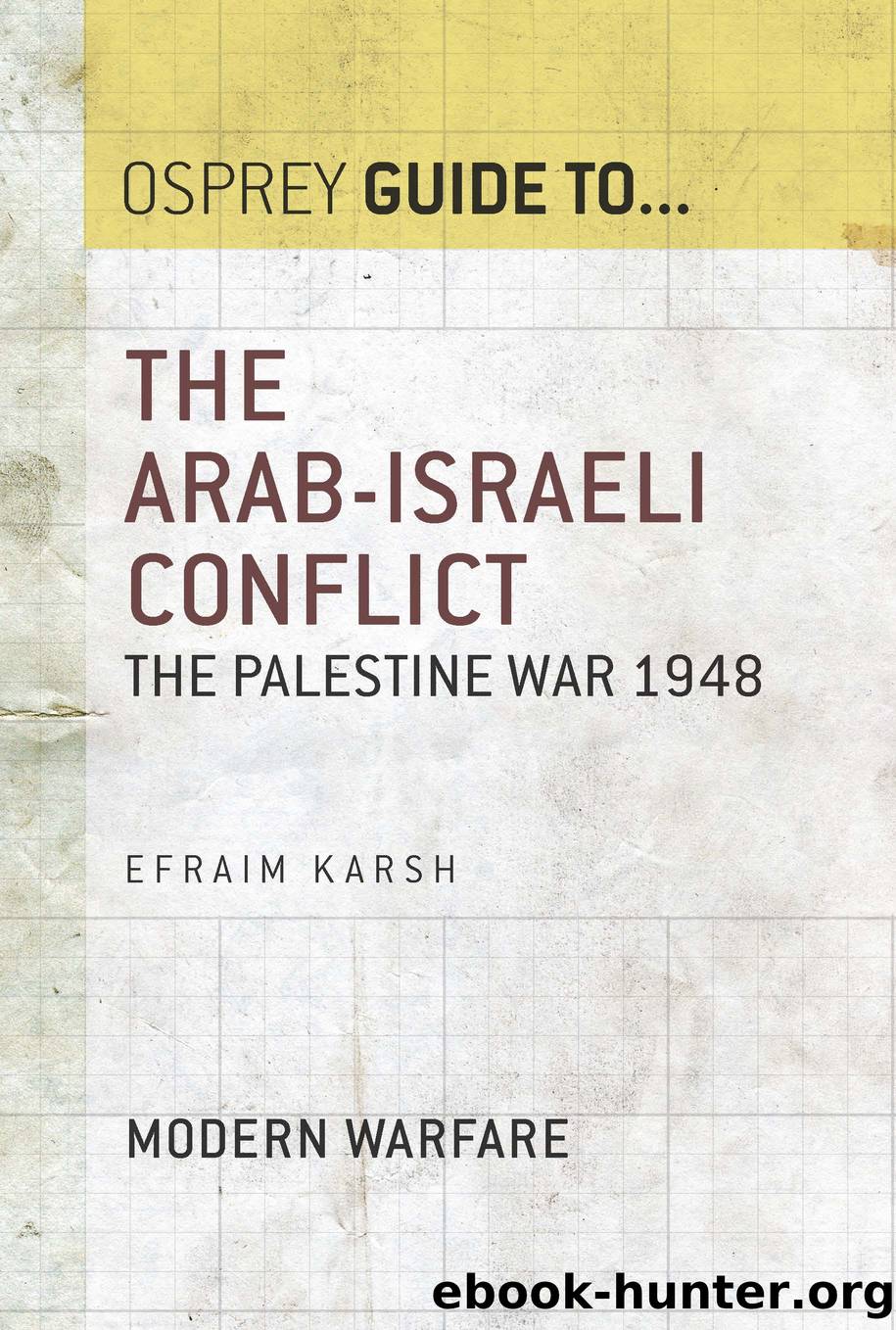The Arab-Israeli Conflict: The Palestine War 1948 by Karsh Efraim

Author:Karsh, Efraim
Language: eng
Format: epub
Tags: The Arab-Israeli Conflict: The Palestine War 1948
ISBN: 9781472810014
Publisher: Osprey Publishing Ltd
On the eve of invasion
By mid-May, the war effort of the Palestinian Arabs had all but collapsed. Their foremost military leaders had either been killed (notably Abd al-Qader al-Husseini) or discredited (Hasan Salame), with their forces thrown into disarray. The ALA was smarting from the Mishmar-Haemek defeat. Four of the six mixed towns â Haifa, Jaffa, Safed and Tiberias â were in Jewish hands, while Acre had been isolated. Only in Jerusalem did the Arabs hold their ground and even there a mass flight from many neighbourhoods took place. Some 100 Arab villages throughout the country had been deserted by their inhabitants or captured by the Hagana, which by now had re-opened the main road arteries in the north and south of the country to Jewish transportation. About 200,000 Palestinians had fled their homes, many of them to the neighbouring Arab states.
For its part the Yishuv remained wary of the formidable obstacles that lay ahead. âWe are still far away from the required force to meet 15th May,â Ben-Gurion told a high-level meeting on 16 April 1948. âWe lack almost half of the necessary manpower, about 80 per cent of the vehicles, and substantial additional equipment.â
On 7 May, a week before the termination of the British Mandate, Ben-Gurion was still concerned. After a sustained mobilisation drive, begun in the wake of the UN partition vote, the Hagana had mustered some 29,900 members: 16,400 field fighters organised in nine brigades and 13,500 settlers defending their villagers and towns. Yet only 60 per cent of the fighters were armed (for example, 1,200 of 2,200 fighters in the Alexandroni Brigade and 1,200 of 2,000 in the Givati Brigade) and there were serious shortages in explosives, ammunition and vehicles.
In a last-ditch attempt to prevent an Arab invasion, Ben-Gurion sent Golda Meir, Acting Head of the Jewish Agencyâs Political Department, on a secret mission to King Abdallah, who in early May was made commander-in-chief of the impending pan-Arab campaign. The two had already met secretly on 17 November 1947, but had failed to reach an agreement due to Abdallahâs desire to annex the whole of Palestine, or at least its Arab parts, to his kingdom, and Meirâs insistence on a two-state solution in accordance with UNSCOP majority recommendations. In their second meeting, on 11 May 1948, the king was no more receptive to the idea of Jewish statehood. âWhy are you in such a hurry to proclaim your state?,â he asked. âWhy donât you wait a few years? I will take over the whole country and you will be represented in my parliament. I will treat you very well and there will be no war.â Meirâs categorical rejection of the idea failed to impress the king. Even as she was taking her leave, Abdallah reiterated his request to consider his offer, âand if the reply were affirmative, it had to be given before 15 Mayâ.
As the king was meeting with Mrs Meir, his Arab Legion was battering the Etzion Bloc. The attack began on 4
Download
This site does not store any files on its server. We only index and link to content provided by other sites. Please contact the content providers to delete copyright contents if any and email us, we'll remove relevant links or contents immediately.
Blood and Oil by Bradley Hope(1558)
Wandering in Strange Lands by Morgan Jerkins(1417)
Ambition and Desire: The Dangerous Life of Josephine Bonaparte by Kate Williams(1383)
Daniel Holmes: A Memoir From Malta's Prison: From a cage, on a rock, in a puddle... by Daniel Holmes(1329)
Twelve Caesars by Mary Beard(1313)
It Was All a Lie by Stuart Stevens;(1294)
The First Conspiracy by Brad Meltzer & Josh Mensch(1167)
What Really Happened: The Death of Hitler by Robert J. Hutchinson(1154)
London in the Twentieth Century by Jerry White(1145)
The Japanese by Christopher Harding(1130)
Time of the Magicians by Wolfram Eilenberger(1125)
Twilight of the Gods by Ian W. Toll(1117)
Cleopatra by Alberto Angela(1093)
A Woman by Sibilla Aleramo(1092)
Lenin: A Biography by Robert Service(1073)
John (Penguin Monarchs) by Nicholas Vincent(1068)
The Devil You Know by Charles M. Blow(1024)
Reading for Life by Philip Davis(1023)
The Life of William Faulkner by Carl Rollyson(980)
